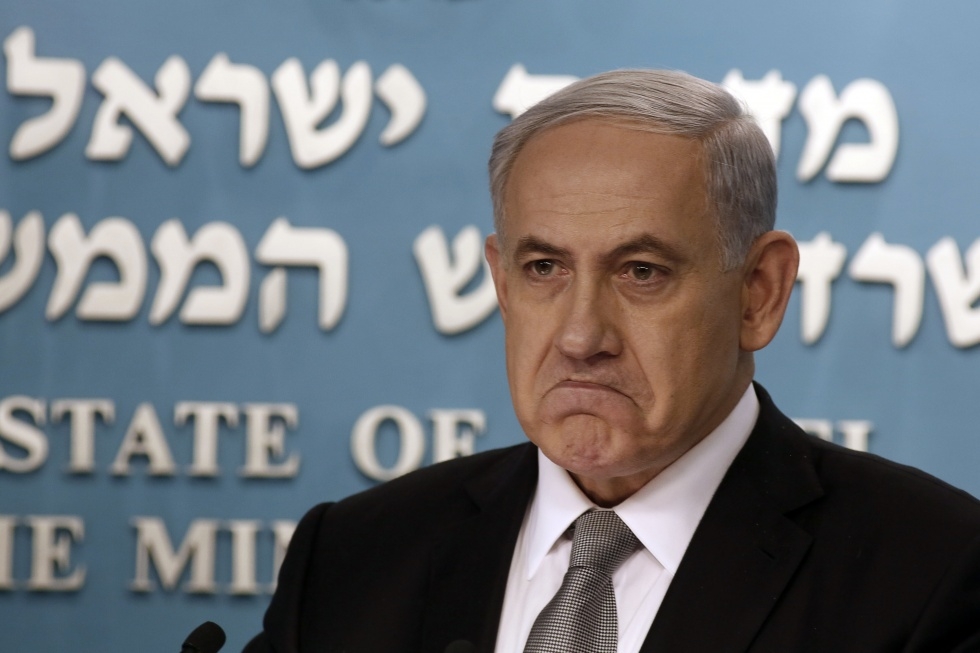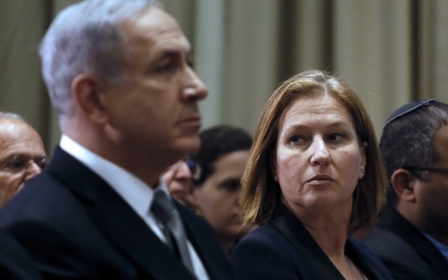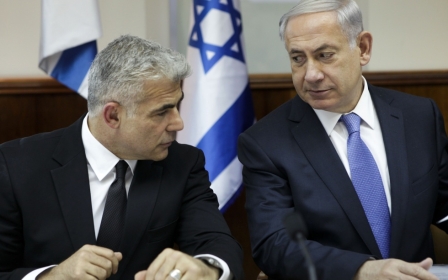Israeli elections: A bigger challenge than Netanyahu expects

When Prime Minister Binyamin Netanyahu met his Finance Minister Yair Lapid last night, reports in the Israeli press still speculated that a compromise, a last minute way out of a political crisis threatening to bring about the earliest elections in the last 50 years, could be reached.
But the moment the door opened and Lapid stepped out of the prime minister's office, it was clear that only a miracle could prevent Israelis from going back to the polls.
While the date is not finalised, it is expected that Israel will have a new parliament no later than April 2015.
The most immediate and obvious explanation for Netanyahu's decision to risk losing power more than two years before his current term is supposed to end, is to be found in the total lack of trust between himself and Lapid, head of the Yesh Atid party. Lapid, a popular television anchorman who entered politics by winning a stunning 19 seats in the last elections, did not hide his ambitions to replace Netanyahu. Their sitting together in the same government for two years did not ease the tension; in fact, it was just the opposite.
Netanyahu claimed that Lapid wanted to topple him by trying to form an alternative coalition within the current parliament. Even if Lapid did have such hopes, it was highly unlikely that he would have been able to garner the 61 votes needed for a majority in the Knesset, the Israeli parliament. But Netanyahu seemed haunted by the idea.
After a majority in the Knesset approved a preliminary law three weeks ago to curb the free distribution of "Israel Hayom" (Israel Today), a daily newspaper sponsored by Netanyahu’s close friend, the Jewish-American billionaire Sheldon Edelson, the prime minister became almost obsessed with conspiracy theories in which Lapid played a major part.
Going into an early election seemed like the best way to foil these threats.
Blowback from Gaza war
From its beginnings in March 2013, Netanyahu's third government was a hybrid one. Instead of aligning himself with "natural" rightist allies, he formed a more centrist coalition: the right-wing Jewish Home on the one hand, Lapid and peace-process loving Tzipi Livni on the other, and Netanyahu's Likud in the middle. The ultra-Orthodox, long-time allies of Israel's right-wing governments stayed out of the coalition.
In a speech on Tuesday, Netanyahu admitted that this coalition was "forced" on him, but it is clear that back then, Netanyahu had an interest in forming a more moderate-looking government. The resumption of talks with the Palestinians under the guidance of US Secretary of State John Kerry only strengthened this image, and for a moment – maybe for the first time since he came into power in 1996 – Netanyahu stood a chance of being considered a man of peace.
But this moment did not last long.
The US-sponsored talks broke down in April 2014, Palestinians formed a unity government between Fatah and Hamas, and all political contact between Israel and the Palestinian Authority were frozen, except for military cooperation.
At first, this political void did not affect the government. Livni and Lapid expressed their discontent at a lack of progress in negotiations, but their protest was very mild. Lapid proposed an initiative to abolish Value Added Tax (VAT) on apartments for young couples and Livni talked about her commitment to the peace process, but the coalition seemed poised to fulfill its term.
But then came the kidnapping and killing of the three settler teenagers in June in the West Bank, the kidnapping and burning alive of a Palestinian teenager in East Jerusalem three weeks later, and above all – the 50-day military operation in Gaza in the summer. The relative calm that the Israeli public enjoyed since Netanyahu’s second term began in 2009 was shattered.
From a strictly military point of view, it may be too early to say who won or lost Operation Defensive Edge, Israel or Hamas. Yet it cannot be disputed that the general feeling among the Israeli public was that its potent army was not able to crush a small and poorly-equipped guerrilla organisation, after suffering considerable casualties in the battlefield and allowing Hamas to paralyse Israel's economy for two months.
Netanyahu, elected under the slogan "Strong on Hamas", was accused by his right-wing partners of being extremely soft on the Islamic group, and polls showed that he was losing votes to Naftali Bennett's Jewish Home party. Despite declaring victory over Hamas, Netanyahu feared he was losing his own constituency and decided to make a sharp turn to the right.
'History is repeating itself'
In 1998, during his first term in government, Netanyahu came under heavy criticism from the settlers' lobby after signing the Wye Plantation memorandum with then-Palestinian President Yasser Arafat, in which Israel agreed to transfer large parts of the West Bank to Palestinian control. Netanyahu reacted to the criticism by freezing an Israeli withdrawal under various pretexts.
Now, it seems that history is repeating itself.
From Operation Defensive Edge onwards, Israel has not known a week of quiet: while most of the events took place in Jerusalem, a soldier was also stabbed to death in Tel Aviv, a settler was killed in Gush Etzion in the West Bank, and angry riots erupted after the killing of an Arab youth in Kfar Kana in northern Israel by policemen. Personal security, once considered one of Netanyahu's main strengths, was starting to look like a nightmare.
Yet instead of trying to ease tensions, Netanyahu chose to escalate the situation: first by allowing extremists from the Temple Mount movements to intensify their activity in the area, giving Palestinians reasons to believe that they are about to change the delicate status quo there, and secondly by using aggressive rhetoric against the Palestinian Authority and Palestinian citizens of Israel.
The notorious Jewish Nation-State Law, with all its negative implications for non-Jews in Israel, was just another landmark on Netanyahu's path rightwards.
Netanyahu's shift to the right after the Wye memorandum in 1998 led to early elections in 1999 where he lost power to the Labor party. But it is much too early to say whether this scenario could repeat itself in 2015. The polls do not predict a victory for the Labor party and its allies, but Netanyahu is not guaranteed to win, either.
One thing is certain: the war on Gaza, which seemed almost forgotten, did eventually influence the Israeli political scene. Israel’s 2009 elections focused largely on social issues; the upcoming vote will centre around personal security, the Jewish identity of Israel, and Israel's position on the international scene. It may prove a bigger change than expected.
Meron Rapoport is an Israeli journalist and writer, winner of the Napoli International Prize for Journalism for a inquiry about the stealing of olive trees from their Palestinian owners. He is ex-head of the News Department in Haaertz, and now an independent journalist.
The views expressed in this article belong to the author and do not necessarily reflect the editorial policy of Middle East Eye.
New MEE newsletter: Jerusalem Dispatch
Sign up to get the latest insights and analysis on Israel-Palestine, alongside Turkey Unpacked and other MEE newsletters
Middle East Eye delivers independent and unrivalled coverage and analysis of the Middle East, North Africa and beyond. To learn more about republishing this content and the associated fees, please fill out this form. More about MEE can be found here.





